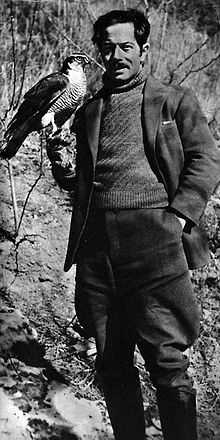Sten Bergman

Sten Bergman (20 October 1895 – 19 February 1975) was a Swedish zoologist, who visited Korea, Kamchatka, Papua New Guinea, and many other places.
Bergman's bear
In 1920 Bergman observed the skin of a black Kamchatkan bear, and noted it was much larger than bears commonly found in the area, with shorter hair.[1] He also described several large tracks that had been found and termed the bear Ursus arctos piscator, although it is usually known as Bergman's Bear. No sightings of the species have been reported since Bergman's description in 1936.
Expedition to Korea
Bergman's 1938 book In Korean Wilds And Villages recounts an expedition to study the birds found in the North of Korea.[2] Traveling with a taxidermist, Bergman also collected specimens for the Swedish Natural History and Ethnographical museums. The book also provides commentaries on various aspects of Korean culture and wildlife.
Cannibalism In New Guinea
In his 1962 book My father is a cannibal, Bergman relates the experiences of two years spent with his wife in New Guinea from 1956 to 1958.[3] He describes his adoption by the Papuan Chief Pinim, and his wife, Akintjes, and the festivals, ceremonies and cannibalistic practises of the native Papuans. The book also includes his observations of interesting plants and animals, including the tree kangaroos, forest turkeys, flame-coloured lianas, Bauhinia and flying beetles.
Bibliography
- Through Kamchatka by Dog-Sled and Skis by Sten Bergman (Seeley, Service & Co., Ltd., 1927), ISBN 978-1-135-48149-0.[4]
- Sport and exploration in the far east by Sten Bergman (Methuen & Co. 1933)[5]
- In Korean Wilds And Villages by Sten Bergman (1938), Translated by F. Whyte.[2]
- My Father Is A Cannibal by Sten Bergman (Robert Hale, 1961)[3]
Blåhake, Tiger, Pungbjörn Och Andra Djur by Sten Bergman, Albert Bonniers Förlag 1947
References
|